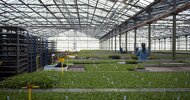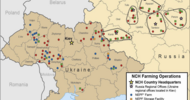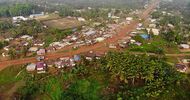Bloomberg | Oct 16, 2012
MetLife bets on Brazil farms as bond yields hurt results
By Zachary Tracer
MetLife Inc. (MET), the largest U.S. life insurer, started a business to make agricultural loans in Brazil as insurers expand in developing markets and seek investments to boost income with interest rates near record lows.
“This is about taking advantage of opportunities that will benefit us over the next several years, perhaps decades,” Chief Investment Officer Steven Goulart said in an interview. “As we build our business in Latin America, identifying investment opportunities like we’ve done with agricultural lending will be an important part of how we manage our portfolio.”
Agricultural loans in the 2011 to 2012 growing season totaled 107 billion reais ($53 billion), according to Brazil’s Agriculture Ministry. There may be demand for more than twice that amount, said Luiz Antonio Correa, director of the ministry’s rural risk management department.
MetLife opened a two-person office in Sao Paulo in the first expansion of the company’s agricultural lending beyond North America, said Robert Merck, who leads the real estate and agricultural investments group. New York-based MetLife had $12.85 billion of agricultural mortgages as of June 30 in its investment portfolio of more than $500 billion.
“There’s good relative value in making these loans, and that’s why we are in the business,” Merck said. “We get a premium over” Brazilian government debt.
Investors demand about 1.45 percentage points of extra yield to own Brazilian government dollar bonds instead of U.S. Treasuries, down from 2.25 percentage points at the end of last year, according to JPMorgan Chase & Co. Brazil reduced its benchmark rate to 7.25 percent on Oct. 10, the 10th-straight cut, as the central bank works to revive an economy forecast to grow slower than the U.S. this year.
Government Subsidy
The interest rate for agricultural credit will be 5.5 percent for the 2012 to 2013 season, down from 6.75 percent in the prior period, Brazil’s government said in June. Private lenders may charge as much as 25 percent, according to the U.S. Department of Agriculture’s Economic Research Service.
That compares with the 1.81 percent yield 10-year Treasuries have averaged this year. The Federal Reserve has said it will keep rates near zero at least through the middle of 2015 to stimulate growth in the world’s largest economy.
MetLife is making five- and 10-year agricultural mortgages in dollars to growers of crops from soybeans to sugarcane, as well as to farmers who raise livestock, Merck said. He declined to give the interest rates.
Brazil Market
With more than 5 million customers in Brazil, MetLife is the nation’s eighth-largest life insurer, and sells dental and accident-and-health coverage. The firm expanded in Brazil through acquisitions including dental insurer Odonto A Saude Empresarial in 2008 after entering the country in 1999.
“As the portfolio needs grow in Brazil, then there may be the opportunity to expand agricultural lending in Brazil,” said Goulart, 54.
Goulart’s role at MetLife has grown since he joined in 2006 from Bear Stearns Cos. to oversee mergers and acquisitions. He became chief investment officer last year, following a promotion to treasurer in 2009. On Oct. 9, MetLife said he would supervise an expansion into managing assets for institutional clients.
Merck will oversee the real estate arm of the effort, which also includes private debt placements. Chris Breslin, a company spokesman, said the firm won’t open the Brazilian agricultural loans business to institutional investors.
Principal Financial
Principal Financial Group Inc. (PFG) has also expanded in Latin America via acquisitions and said Oct. 8 it would spend about $1.5 billion to buy a Chilean pension provider in the largest- ever deal for the Des Moines, Iowa-based insurer. Principal said earlier this year it would buy a Brazilian mutual fund provider.
Prudential Financial Inc. (PRU)’s real estate unit has been investing in Latin America since 2001. It hired Alfonso Munk from Morgan Stanley (MS) in July to oversee more than $3.2 billion in gross assets in the region.
Brazil is the world’s largest exporter of commodities including sugar, orange juice, coffee and beef, and may become the biggest soybean exporter, according to the USDA.
Brazilian farmers are poised to harvest a record soybean crop, according to estimates from Celeres. Soybean output for the 2012-2013 crop season may rise 19 percent from the prior year to 79.1 million tons, the agricultural consulting firm estimated.
Demand Rising
Correa of Brazil’s Agriculture Ministry said demand for agriculture loans may reach 250 billion reais.
“Brazil is a vast country with a lot of agricultural production,” Correa said in an interview. “It is a country that presents lots of opportunity for investors.”
Agricultural lending is a good bet for MetLife because a growing global population will boost demand for food, and Brazilian farmers can improve productivity, said Allen Featherstone, a professor of agricultural economics at Kansas State University.
“You’re going to see Brazil continue to grow in production over the next 10 to 20 years,” Featherstone said by phone from Manhattan, Kansas. “The biggest thing they’re catching up on is efficiency.”
MetLife sent Joseph Herrmann, who helped oversee farm lending in the central U.S., to help start the Brazil business. Herrmann, a graduate of Kansas State, is regional director for MetLife Agricultural Investments’ Latin America operation and has worked at the insurer since 2008.
Still Expanding
The firm also hired Henrique Sperandio in February to be associate director of the Brazil office. He previously worked at Lloyds Banking Group Plc, in the origination of structured and trade finance transactions. MetLife is still seeking to add a farm-lending analyst and a loan-production employee, Merck said.
TIAA-CREF, the manager of retirement accounts for employees of nonprofits, is also betting on farmers. The firm, with other pension and money managers, is investing $2 billion in farmland in the U.S., Australia and Brazil, via TIAA-CREF Global Agriculture LLC., it said in May.
“We see increased protein consumption in developing economies and alternative energy mandates driving increased demand for food, fiber and fuel,” Jose Minaya, a TIAA-CREF managing director, said in a statement. “Farmland also acts as a hedge against inflation.”
To contact the reporter on this story: Zachary Tracer in New York at [email protected]. To contact the editor responsible for this story: Dan Kraut at [email protected].
MetLife bets on Brazil farms as bond yields hurt results
By Zachary Tracer
MetLife Inc. (MET), the largest U.S. life insurer, started a business to make agricultural loans in Brazil as insurers expand in developing markets and seek investments to boost income with interest rates near record lows.
“This is about taking advantage of opportunities that will benefit us over the next several years, perhaps decades,” Chief Investment Officer Steven Goulart said in an interview. “As we build our business in Latin America, identifying investment opportunities like we’ve done with agricultural lending will be an important part of how we manage our portfolio.”
Agricultural loans in the 2011 to 2012 growing season totaled 107 billion reais ($53 billion), according to Brazil’s Agriculture Ministry. There may be demand for more than twice that amount, said Luiz Antonio Correa, director of the ministry’s rural risk management department.
MetLife opened a two-person office in Sao Paulo in the first expansion of the company’s agricultural lending beyond North America, said Robert Merck, who leads the real estate and agricultural investments group. New York-based MetLife had $12.85 billion of agricultural mortgages as of June 30 in its investment portfolio of more than $500 billion.
“There’s good relative value in making these loans, and that’s why we are in the business,” Merck said. “We get a premium over” Brazilian government debt.
Investors demand about 1.45 percentage points of extra yield to own Brazilian government dollar bonds instead of U.S. Treasuries, down from 2.25 percentage points at the end of last year, according to JPMorgan Chase & Co. Brazil reduced its benchmark rate to 7.25 percent on Oct. 10, the 10th-straight cut, as the central bank works to revive an economy forecast to grow slower than the U.S. this year.
Government Subsidy
The interest rate for agricultural credit will be 5.5 percent for the 2012 to 2013 season, down from 6.75 percent in the prior period, Brazil’s government said in June. Private lenders may charge as much as 25 percent, according to the U.S. Department of Agriculture’s Economic Research Service.
That compares with the 1.81 percent yield 10-year Treasuries have averaged this year. The Federal Reserve has said it will keep rates near zero at least through the middle of 2015 to stimulate growth in the world’s largest economy.
MetLife is making five- and 10-year agricultural mortgages in dollars to growers of crops from soybeans to sugarcane, as well as to farmers who raise livestock, Merck said. He declined to give the interest rates.
Brazil Market
With more than 5 million customers in Brazil, MetLife is the nation’s eighth-largest life insurer, and sells dental and accident-and-health coverage. The firm expanded in Brazil through acquisitions including dental insurer Odonto A Saude Empresarial in 2008 after entering the country in 1999.
“As the portfolio needs grow in Brazil, then there may be the opportunity to expand agricultural lending in Brazil,” said Goulart, 54.
Goulart’s role at MetLife has grown since he joined in 2006 from Bear Stearns Cos. to oversee mergers and acquisitions. He became chief investment officer last year, following a promotion to treasurer in 2009. On Oct. 9, MetLife said he would supervise an expansion into managing assets for institutional clients.
Merck will oversee the real estate arm of the effort, which also includes private debt placements. Chris Breslin, a company spokesman, said the firm won’t open the Brazilian agricultural loans business to institutional investors.
Principal Financial
Principal Financial Group Inc. (PFG) has also expanded in Latin America via acquisitions and said Oct. 8 it would spend about $1.5 billion to buy a Chilean pension provider in the largest- ever deal for the Des Moines, Iowa-based insurer. Principal said earlier this year it would buy a Brazilian mutual fund provider.
Prudential Financial Inc. (PRU)’s real estate unit has been investing in Latin America since 2001. It hired Alfonso Munk from Morgan Stanley (MS) in July to oversee more than $3.2 billion in gross assets in the region.
Brazil is the world’s largest exporter of commodities including sugar, orange juice, coffee and beef, and may become the biggest soybean exporter, according to the USDA.
Brazilian farmers are poised to harvest a record soybean crop, according to estimates from Celeres. Soybean output for the 2012-2013 crop season may rise 19 percent from the prior year to 79.1 million tons, the agricultural consulting firm estimated.
Demand Rising
Correa of Brazil’s Agriculture Ministry said demand for agriculture loans may reach 250 billion reais.
“Brazil is a vast country with a lot of agricultural production,” Correa said in an interview. “It is a country that presents lots of opportunity for investors.”
Agricultural lending is a good bet for MetLife because a growing global population will boost demand for food, and Brazilian farmers can improve productivity, said Allen Featherstone, a professor of agricultural economics at Kansas State University.
“You’re going to see Brazil continue to grow in production over the next 10 to 20 years,” Featherstone said by phone from Manhattan, Kansas. “The biggest thing they’re catching up on is efficiency.”
MetLife sent Joseph Herrmann, who helped oversee farm lending in the central U.S., to help start the Brazil business. Herrmann, a graduate of Kansas State, is regional director for MetLife Agricultural Investments’ Latin America operation and has worked at the insurer since 2008.
Still Expanding
The firm also hired Henrique Sperandio in February to be associate director of the Brazil office. He previously worked at Lloyds Banking Group Plc, in the origination of structured and trade finance transactions. MetLife is still seeking to add a farm-lending analyst and a loan-production employee, Merck said.
TIAA-CREF, the manager of retirement accounts for employees of nonprofits, is also betting on farmers. The firm, with other pension and money managers, is investing $2 billion in farmland in the U.S., Australia and Brazil, via TIAA-CREF Global Agriculture LLC., it said in May.
“We see increased protein consumption in developing economies and alternative energy mandates driving increased demand for food, fiber and fuel,” Jose Minaya, a TIAA-CREF managing director, said in a statement. “Farmland also acts as a hedge against inflation.”
To contact the reporter on this story: Zachary Tracer in New York at [email protected]. To contact the editor responsible for this story: Dan Kraut at [email protected].














